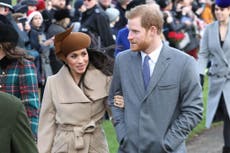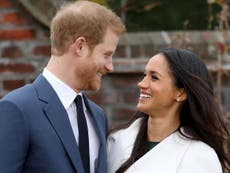Why the BBC shouldn’t waive the licence fee for the royal wedding
It seems that these royal weddings keep coming at the perfect time to distract the public from the undeniable evidence of the flaws in our political system which lead to disasters such as Brexit

Great news for those so uninterested in any form of BBC content that they can’t bring themselves to pay £12.50 per month to keep it funded: apparently they’re going to be allowed to watch the wedding between the ginger bloke and Rachel Zane from Suits for free if they venture to a street party. Score.
The rationale here is that the event is of such “great national importance” that it would be just so incredibly unfair to deprive anyone of the opportunity to watch a live stream of two complete strangers’ outrageously lavish wedding.
While I can get behind the principle that we should all have the inherent right to watch something our taxes are paying for, I can certainly think of better examples of publicly funded events which would actually be beneficial to the public to be able to watch: Prime Minister’s Questions, for example. Or TV coverage of the upcoming local elections (not to mention the general ones, reporting of which is limited to those of us willing to pay for it).
In order for everyone to have access to an unbiased media, the licence fee would need to be scrapped in favour of a form of progressive taxation, whereby a percentage of your income tax relative to your earnings goes directly into the coffers of the BBC. The reason we have a licence fee system instead is because the British public struggles to wrap its head around the concept of paying more for something you might use less for the benefit of society as a whole, even though this is the basis of a welfare state which we purport to value in this country.
Access to impartial information is crucial to the democratic process, and inevitably a media organisation that’s not reliant on charging advertisers or users to stay afloat will, if nothing else, at least be perceived as more reliable than the for-profit alternatives, whose main focus it is to please stakeholders. Yet neither the current nor former governments, nor the BBC itself, seems interested in providing unfettered access to the issues which are of legitimate importance to our society.
When the UK decided to broadcast live debates between prime ministerial candidates in the run-up to the 2010 election, people without licence fees weren’t offered the opportunity to watch regardless. In fact only one of the debates was broadcast on the BBC, with the final one shown exclusively on Murdoch-owned Sky News, excluding anyone without access to the channel from watching.
And yet when the following year the other prince married some girl he met at uni, the TV licence was waived in order to ensure the entire country was able to witness one of the most expensive weddings of all time, just as the coalition government introduced VAT hikes, public sector pay freezes and huge welfare cuts in a cruel austerity budget that economists say not only left millions worse off but ended up harming the economy in the long term. Had George Osborne's 2010 Budget been broadcast for free at street parties across the country, one wonders if it might have been met with the mass outrage it deserved.
While we are not today in the midst of a recession, the UK is certainly facing unprecedented challenges, with political parties (and their supporters) more polarised than ever, and the future of the country both socially and economically uncertain as we embark on the diplomatic and economic disaster that is leaving the European Union.
If ever there were an question of how a lack of information and trustworthy media can ruin a country, surely the Brexit campaigns and referendum – in all their lies, opacity and confusion – are a prime example.
It seems that these royal weddings keep coming at the perfect time to distract the public from the undeniable evidence of the flaws in our political system. Who doesn’t like the idea of a real life Disney movie taking place before their very eyes?
In fact what will be broadcast on television on 19 May will be two people contractually binding themselves together for the purposes of our entertainment, in the most overblown ostentatious way possible. It will – as almost all weddings do – propagate outdated values of heteronormative ideals, religious indoctrination, women being viewed as property, and extreme consumerism in the form of diamond rings and designer clothes as a symbol of love.
The BBC, by making the choice that this event is worthy of waiving its licence fee, is failing in its duty of impartiality, and telling us that we must view the monarchy with utmost respect and relevance, even though their value to the British public is primarily as a form of entertainment more akin to the Kardashians than anything else.
With the undeniably disastrous consequences of Brexit around the corner, the government needs us to hold on to some false sense of patriotism and national identity to get us through the long cold years of isolationism we have ahead of us. By suggesting the royal wedding is the most important national event to occur since… well, since the last royal wedding, we’re being fed monarchical propaganda in an attempt to brainwash us into forgetting – or at least ignoring – the real issues at hand.




Join our commenting forum
Join thought-provoking conversations, follow other Independent readers and see their replies